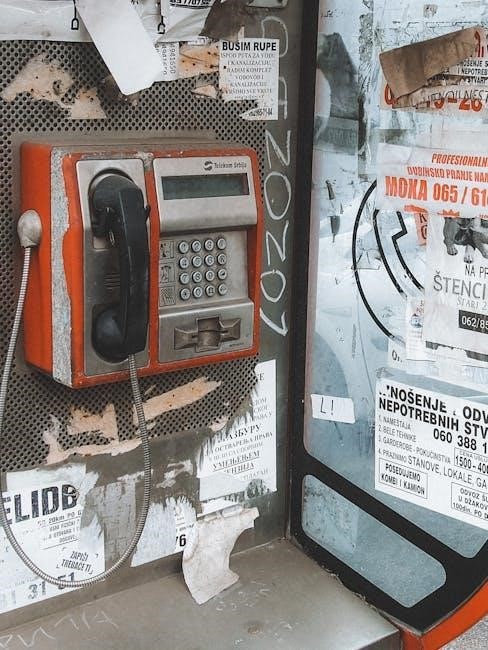The Connecticut Notary Public Manual serves as an official guide for notaries, detailing their roles, responsibilities, and legal obligations. It ensures compliance with state laws and ethical standards, providing a comprehensive resource for professionals.
1.1 Overview of the Notary Public Role
The notary public serves as a public official appointed by the Connecticut Secretary of the State. Their primary role includes administering oaths, witnessing signings, and verifying document authenticity. Notaries act as impartial witnesses to prevent fraud and ensure the integrity of legal processes. They are entrusted with upholding public trust and maintaining the highest ethical standards in their duties.
1.2 Importance of the Manual for Notaries
The Connecticut Notary Public Manual is essential for guiding notaries in understanding their duties, legal responsibilities, and ethical obligations. It provides detailed instructions on performing notarial acts, maintaining records, and adhering to state laws. The manual ensures notaries remain informed about updates, such as Public Act 23-28 on remote notarization, and helps them uphold professional standards to avoid legal or disciplinary actions.

The Notary Public as a Public Official
The notary public is a public official appointed by the Secretary of the State, serving as an impartial witness to document signings and administering oaths.
2.1 Definition and Responsibilities
A Connecticut Notary Public is a public official appointed by the Secretary of the State, serving as an impartial witness to document signings. Their primary duties include administering oaths, taking acknowledgments, and verifying document signatures. Notaries must ensure authenticity, maintain impartiality, and uphold public trust. They are authorized to perform duties as outlined by state law, ensuring compliance with legal and ethical standards in all notarial acts.
2.2 Powers Granted by State Law
The Connecticut Notary Public is empowered by state law to administer oaths, take acknowledgments, and perform other authorized notarial acts. They have the authority to verify the identity of signers, witness document signings, and ensure the authenticity of transactions. These powers are granted to maintain public trust and uphold the integrity of legal processes, as outlined in the Connecticut General Statutes and the Notary Public Manual.
Application and Appointment Process
Applicants must submit a completed form, pay the fee, and pass an exam to qualify for a Notary Public commission in Connecticut, meeting eligibility criteria.
3.1 Eligibility Requirements
To qualify as a Connecticut Notary Public, applicants must be at least 18 years old and reside or have a principal place of business in the state. They must not have been convicted of a felony or a crime involving dishonesty or moral turpitude. The Secretary of the State may deny appointment based on criminal history or other disqualifying factors. Applicants must also demonstrate good moral character and meet all legal requirements.
3.2 Application Submission and Fee
The application for a Connecticut Notary Public commission requires a non-refundable fee of $120 as of 2023. Applicants must submit a completed application form and pay the fee via check or money order. The application must be sent to the Secretary of the State’s office for processing. It is essential to ensure all details are accurate and complete to avoid delays in the approval process;
3.3 Examination Process
The examination process for Connecticut Notary Public applicants involves a written test administered by the Secretary of the State. The exam assesses knowledge of notary duties, legal requirements, and ethical standards. Preparation resources, including study guides and practice exams, are available to ensure applicants thoroughly understand their roles and responsibilities. Passing the exam is essential to demonstrate competence and proceed with the commission process successfully.
Remote Notarization in Connecticut
Remote notarization in Connecticut is governed by Public Act 23-28, effective October 1, 2023, which outlines procedures and guidelines for conducting remote notarial acts securely and legally.
4.1 Public Act 23-28 and Its Impact
Public Act 23-28, effective October 1, 2023, enables remote notarization in Connecticut, allowing notaries to perform virtual notarial acts. This legislation modernizes notary services, increasing accessibility while maintaining security and compliance with state laws. It ensures that remote notarizations adhere to strict guidelines, safeguarding the integrity of legal documents and expanding convenience for residents and businesses statewide.
4.2 Implementation and Guidelines
The implementation of remote notarization in Connecticut requires adherence to specific guidelines. Notaries must use approved electronic tools, verify identities through secure methods, and conduct audio-visual sessions. Record-keeping and proper documentation are mandatory. The Connecticut Notary Public Manual provides detailed instructions, ensuring compliance with state regulations and maintaining the integrity of remote notarial acts. Training and updates are recommended to stay informed about best practices and legal requirements.

Legal and Ethical Considerations
Notaries must adhere to legal and ethical standards, avoiding conflicts of interest and maintaining confidentiality. They must act impartially, ensuring transparency and integrity in all notarial acts.
5.1 Avoiding Conflicts of Interest
Notaries must avoid conflicts of interest to maintain impartiality and ensure ethical practices. This includes refraining from notarizing documents where they have a financial stake or a personal relationship with the signer. The Connecticut Notary Public Manual emphasizes transparency to prevent impropriety. Adhering to these guidelines upholds the integrity of notarial acts, maintains public trust, and ensures compliance with legal standards.
5.2 Maintaining Confidentiality
Maintaining confidentiality is a critical ethical obligation for Connecticut notaries. They must safeguard sensitive information and avoid unauthorized disclosure of document details. Notaries should not discuss or share specifics of the documents they process unless legally required. This ensures trust and upholds the integrity of notarial services, aligning with legal and ethical standards outlined in the Connecticut Notary Public Manual.
Notarial Acts and Procedures
Notarial acts include acknowledgments, oaths, and verifications, ensuring documents are executed legally. Proper identification of signers is essential, maintaining the integrity of each notarial procedure.
6.1 Acknowledgments and Oaths
Acknowledgments and oaths are fundamental notarial acts. An acknowledgment confirms a signer’s voluntary execution of a document, while an oath involves swearing to the truth of a statement. Notaries must verify the signer’s identity, administer oaths impartially, and ensure understanding of the document’s content. These acts uphold the integrity and legal validity of documents in Connecticut.
6.2 Proper Identification of Signers
Proper identification of signers is crucial to prevent fraud. Connecticut requires notaries to verify signers’ identities using at least two forms of identification, one of which must be a government-issued photo ID. Acceptable forms include driver’s licenses, passports, or state IDs. The signer must be present, and the notary must confirm the ID’s validity. This ensures the authenticity and legality of the notarized document.

The Connecticut Notary Public Manual as a Resource
The Connecticut Notary Public Manual is a key resource, providing updated guidance on notary duties, legal requirements, and best practices, ensuring compliance with state laws and ethical standards.
7.1 Key Sections and Updates
The Connecticut Notary Public Manual includes key sections on notary duties, ethical practices, and legal requirements. Recent updates cover Public Act 23-28, remote notarization guidelines, and revised application processes. It also highlights changes in state laws, ensuring notaries stay informed about legislative updates and maintain compliance with current regulations. This resource is essential for understanding the evolving role of notaries in Connecticut.
7.2 Staying Informed About Legislative Changes
The Connecticut Notary Public Manual emphasizes the importance of staying updated on legislative changes. Notaries should regularly review updates from the Secretary of the State and monitor official state websites for new laws or procedural adjustments. Subscribing to newsletters or attending workshops can also provide insights into evolving regulations, ensuring compliance and professionalism in notarial services.

Best Practices for Notaries
Adhering to ethical standards, verifying signer identity, and ensuring document integrity are cornerstone best practices for Connecticut notaries. Staying informed on legal requirements is essential for maintaining professionalism.
8.1 Maintaining Professional Standards
Maintaining professional standards is crucial for Connecticut notaries. This includes being reliable, impartial, and respectful in all interactions. Understanding and adhering to state laws, ethical guidelines, and best practices ensures credibility. Notaries must avoid conflicts of interest, remain informed about legal updates, and uphold the integrity of their role as public officials. Proper documentation and transparency in all notarial acts are essential to maintaining trust and professionalism.
8.2 Record-Keeping and Journaling
Accurate record-keeping and journaling are essential for Connecticut notaries. Maintaining a detailed journal of all notarial acts ensures accountability and transparency. Entries should include the date, names of signers, document types, and fees charged. This documentation helps prevent errors, supports audits, and provides a legal record of services performed. Proper storage and security of these records are critical to uphold professionalism and compliance with state regulations.
Revocation and Denial of Commission
The Connecticut Notary Public Commission can be revoked or denied for convictions, dishonesty, or failure to comply with state laws, as determined by the Secretary of the State.
9.1 Grounds for Revocation
The Secretary of the State may revoke a notary’s commission for convictions of felonies or crimes involving dishonesty, failure to comply with state laws, or misuse of notarial powers. Additionally, breach of ethical standards, such as engaging in fraudulent activities or demonstrating incompetence, can lead to revocation. The state ensures accountability by outlining clear procedures for addressing misconduct and maintaining public trust in notary services.
9.2 Consequences of Misconduct
Misconduct by a notary public can result in the revocation or denial of their commission. Consequences may include legal action, fines, and loss of professional privileges. The Secretary of the State may also impose penalties for violations of state laws or ethical standards. Such actions ensure accountability and uphold the integrity of notarial services in Connecticut, protecting the public from potential harm or fraud.
The Connecticut Notary Public Manual concludes by emphasizing the evolution of the notary role, balancing tradition with modernization, and preparing professionals for future challenges in an ever-changing legal landscape.
10.1 The Evolution of the Notary Public Role
The notary public role has evolved significantly, adapting to technological advancements and legal changes. Once focused on in-person validations, notaries now embrace remote notarization, as detailed in Public Act 23-28. This shift reflects the balance between tradition and modernization, ensuring notaries remain vital in securing document authenticity and integrity in a digitized world while upholding ethical standards and public trust.
10.2 Future of Notary Services in Connecticut
The future of notary services in Connecticut is poised for growth, driven by technological advancements and legislative support. Remote notarization, authorized by Public Act 23-28, will continue to expand, offering greater convenience and accessibility. Enhanced training and updated regulations will ensure notaries remain adaptable to evolving demands while maintaining ethical standards and public trust in their vital role.
